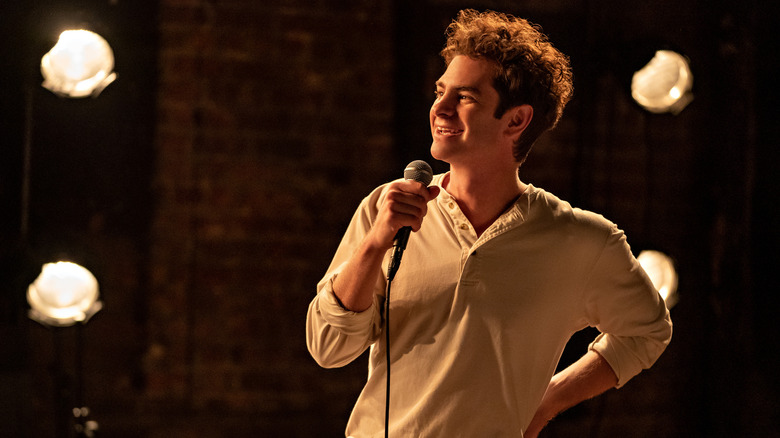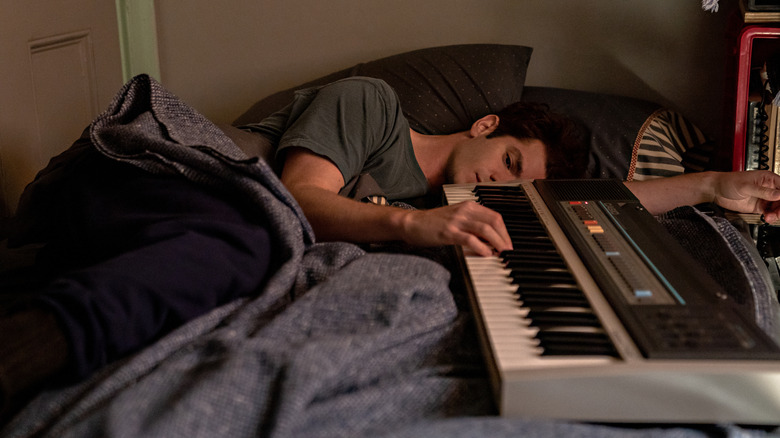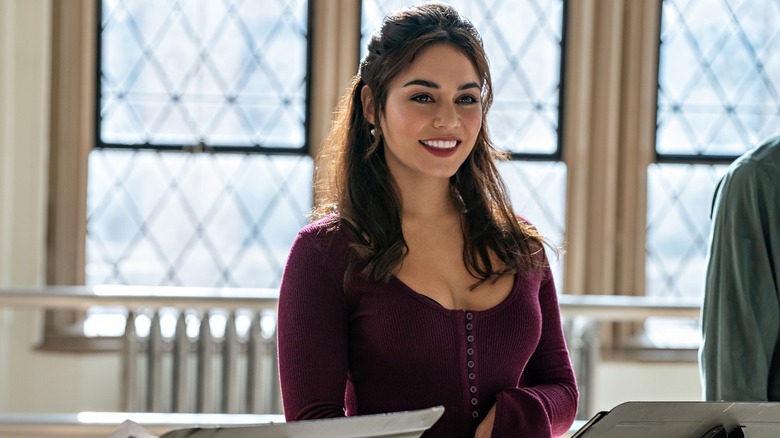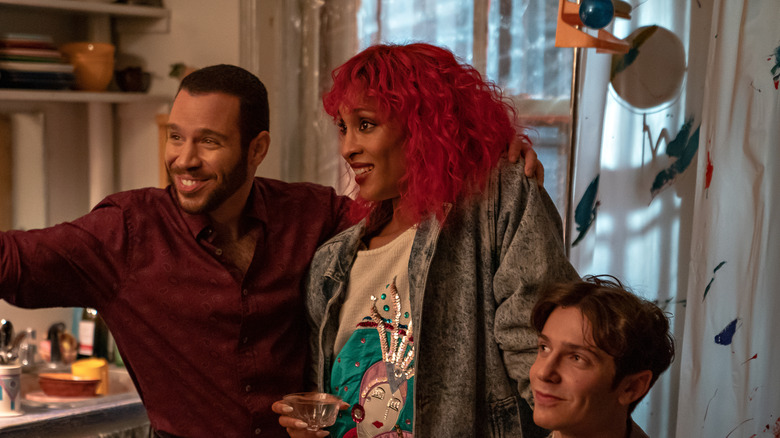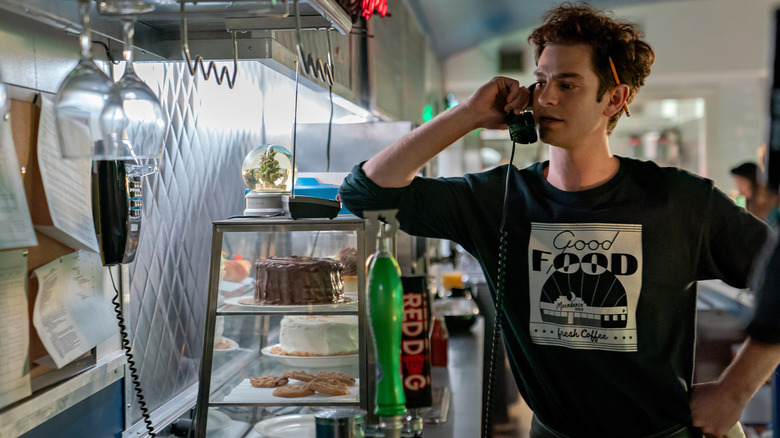Tick, Tick... BOOM! Writer Steven Levenson On Crafting A Love Letter To Musicals [Interview]
Before penning "Dear Evan Hansen," playwright Steven Levenson had never written a musical. His first stab at the job not only won him the 2017 Tony Award for Best Book of a Musical, but led to a Broadway hit that won six more Tonys and spawned a film adaptation (which he also wrote). The reception of said adaptation aside, there's no denying the talents of Levenson, who has continued making his mark in theater, TV and film. He served as writer and showrunner on the Emmy-award winning miniseries, "Fosse/Verdon," and if you think that's all, then maybe you missed the overwhelming love for his latest project, "Tick, Tick... BOOM!"
The Netflix musical serves as a love letter to theater and theater lovers, but most importantly to its subject, Jonathan Larson. Best known as the creator behind "Rent," one of Broadway's longest running musicals, Larson's work reshaped the theater industry for years to come. Levenson is among many, many theater kids (myself included) whose lives were forever altered after encountering a Larson musical — so you can imagine the pressure of paying tribute to the Broadway legend.
That very passion is where "Tick, Tick... BOOM!" thrives, with the film becoming a joyous tribute, tightly packed with love. I had the pleasure of speaking with Levenson about his partnership with director Lin-Manuel Miranda, the struggles of bringing musical from stage to screen, and the mind-boggling talent of the film's star, Andrew Garfield.
"We wanted it to feel like this is Jonathan telling his story."
I assume you were a pretty big theater kid, so I wanted to ask, what was your first experience with Jonathan Larson's work?
I was a pretty big theater kid, that is an accurate assessment. My first experience was seeing "Rent" when I was in seventh grade. I was 12 years old. I had just kind of become a theater kid. I did a musical for my first time in sixth grade and I went to theater summer camp that summer... and then I saw "Rent" and it rocked my world. I'd grown up going to see theater with my parents and I grew up watching the Rodgers & Hammerstein VHS tapes, and I always liked musicals and I liked being a part of them, but there was always something about them that was a little distant for me and a little distancing for me. I never loved show tunes the way that some people do, and there was something that didn't feel quite authentic to me about musicals. Until I saw "Rent."
"Rent" felt like music I wanted to listen to, it felt like the music I would listen to on my own. It felt like this story that was so raw and relevant and jagged and just visceral, and all of these things that I had never seen before on a proscenium. It felt, more than anything to me, like a generational shift. It felt like something that was made for young people and made for a new generation of audiences. I felt a part of that audience and I just felt so captivated by it. I memorized the score. I think I still know it to this day probably, and I fell in love with it, absolutely.
Then in college, as a sophomore, I was still acting and I did a tiny little production of Tick, Tick... Boom! with two friends in the upstairs theater space at school. So, that was how I learned about Tick, Tick... Boom!. But yeah, for me, Jonathan Larson was the gateway drug to not only keep doing shows at school, but to feel like musical theater was this vital, powerful, important thing.
So when you have that connection and the giant legacy of Jonathan Larson — I mean, I feel like if there was a Mount Rushmore of pivotal figures for theater kids, he'd 100% be on it.
For sure.
So where do you even start when you're given a project like this?
Lin from the very beginning, his intention and his goal was to get back to the way that this project initially began and was initially conceived, which was a rock monologue is what Jonathan called it. That was variously called Tick, Tick... Boom!, sometimes it was called Boho Days. He performed it a number of times in his life. It was a 55 minute monologue with a lot of songs and some story.
So we went to the Library of Congress which houses all of Jonathan's papers, and we tracked down basically all of the drafts that they had of this rock monologue. There were many different drafts and none of them were dated, so we sort of had to kind of piece together in our minds the actual chronology of which of these may have gone first and which may have gone second, and trying to figure out why Jonathan may have made the changes that he did from one draft to another.
We basically went back to that original script and took that as the skeleton of the film and put that at the center of the film as he's telling this story, and kind of took it from there. We wanted it to have a feeling of almost a fantasy in certain moments. We wanted it to feel like this is Jonathan telling his story and we're going to get to go inside of his mind and his creativity and his imagination and see how that story unfolded for him in his vernacular, which would've been music. So that kind of became our guiding principle, was telling this story and getting to live the story with him.
"In theater, when somebody opens their mouth to sing in the middle of a scene, we don't really question it. But on film today, you just can't do that."
I don't know about you, but this feels like it's been a year of musicals and you've had this and you've had Dear Evan Hansen. What do you think are the challenges, or what have been the challenges for you of making stage musicals work on screen?
Well, I think there are many inherent challenges to it. I think that the biggest one is there's just a barrier of entry with singing for audiences. In theater, on stage, that convention is just so well-worn, that when somebody opens their mouth to sing in the middle of a scene, we don't really question it. But on film today, you just can't do that. You have to really understand conceptually what the singing is about, you have to really ground it in something and you have to really clear the vocabulary of how you're using the singing. Otherwise the audience is confused or turned off, or it just feels kind of cheesy.
So for this film, that language was really the performance. It was this solo show at the center of the movie that was our way into the singing. The singing always came out of Jon telling the story, and then the singing could kind of permeate his memories and be part of the whole story, but we always wanted to ground it in this real, actual performance. Which I think gives it more of a sense of realism and is maybe a little bit easier for an audience to accept that somebody is singing on a stage, doing a concert.
But I think the other challenge, which is a really fun challenge, is that you want to figure out how to make songs dynamic and compelling on film. On stage, you really can have a character just stand there and sing and it can be incredibly magnetic. And on film, you can't really do that. I mean, you have to figure out how to capture singing cinematically and make it feel part of this thread of this film. That was really fun, working with Lin and with the whole team and trying to devise these numbers basically, really make these all full sequences where we really knew what we were seeing and the story we were telling every time.
So what were some of those decisions and conversations? Because there are those big musical sequences and then there's like... "Green Green Dress" just plays on the radio.
Yes! Lin from the beginning felt very maximalist about the score in a really exciting way, which was just, "These songs are amazing. How many can we get in here? And how many ways can we sneak in as many of them as we can?" So yes, "Green Green Dress" plays on the radio and you have a song like "Sugar," which was actually in the original show that he sings a little riff of to Ira Weitzman in the diner at one point.
We tried to put in all the songs that we could in all of the ways that we could, but I think there were certain songs that just immediately jumped out to us as being kind of cinematic, I suppose, for lack of a better word, or theatrical, like "No More." These songs that really feel like they live really firmly in his imagination, and those we knew would be big set pieces.
Then there are certain songs that are, yes, much more grounded in reality, much more grounded in really simple human emotion. It was just, yeah, trying to figure out how to calibrate all of that. Really, so much of the credit for that goes to Lin, in figuring out tonally, how to move between those worlds and those sequences. But always, I think the guiding principle was that we're moving inside of Jonathan's mind, we're moving inside of his imagination.
So if he's beginning a song on stage, it can become a rap that Black Thought is doing in the middle of Times Square. It can become a music video, because that's what Jonathan is seeing in his mind, even if what we the audience would really be seeing is Jonathan Larson on stage rapping.
"Lin burned through his Rolodex and just reached out to every musical theater legend that he knew."
So how did the big "Sunday" diner scene come to be?
That came to be... it's this moment from the original show. It's a really kind of funny tongue-in-cheek homage to Sondheim's song "Sunday," which is this soaring operatic end of Act One song in his musical "Sunday in the Park with George," but in the original solo show, of course it was just Jon singing this song, which I think was funny and charming. From the beginning, we really wanted it to be this big knockout huge number like it is in "Sunday in the Park with George." Even though it's silly and it's about a diner, what if you actually staged that for real and made it as epic and as grand and as operatic as the original "Sunday"?
So, that was certainly the attempt. It was also for us, we always thought of it as a moment where you are seeing in real-time, Jon the Alchemist, transforming the mundane reality of his life into art and into something transcendent. So that was fun for us, was to imagine him as this kind of conductor of this scene or composer or painter. Then Lin, as he said, burned through his Rolodex and just reached out to every musical theater legend that he knew, which turns out to be quite a lot of them.
From the beginning, we always talked about it as being what it is, which is this who's who of musical theater all-stars and feeling like in the world of Jonathan's imagination, that's who lives there. It's this Pantheon. I love the idea that in that Pantheon, there are actors from shows like "Fun Home" and "Hamilton." Which of course he never saw, but somehow in that strange transcendent time and space, they lived there too. So, I always thought it was a really cool and fun and exciting sequence and really hard to shoot in the middle of the pandemic.
Our editor, Myron, did an incredible job of making it look as seamless as it does, because we had to shoot it really kind of piecemeal to get all of those incredible actors in and out of that space safely. So, I love that sequence. I saw it last night for the first time with an audience, and a lot of theater people in that audience, and that was pretty thrilling.
There's this great meta narrative in the movie about the frustrating reality of being a writer and... Jon is told to move on to his next project, and that being a writer is throwing things against the wall and hoping something sticks. I feel like writing those words as a writer yourself is either really therapeutic or really traumatic.
[Laughs] Yeah, absolutely. I mean, I heard that a lot when I was younger, that was often the feedback I would get is, "Well, we can't wait to see the next one." "Just send us the next one." "We'd love to read your next play," or, "we're very interested in your next play." It was always gratifying to some extent. You're happy that they're interested in you, but it's like, "Well, what about this one? This is the one that I've ... I don't know if there's another one." You never know if there's another one.
Yeah, for me, that is advice that I try to live by without it making me insane. Which is, yeah, that your job really as a writer is just keep writing. How it's received and whether it's successful or not in a way isn't really any of your business, that's not your job. Your job is to just go on to the next one and keep moving forward. That's easier said than done. You can imagine how that can become an unhealthy way of looking at things, but I think for me, it is heartening advice, that the value of what you're doing is in the doing, it's in the work. The writing is the point, so keep going.
"I was like, 'Oh, I love Andrew Garfield. Can he sing?'"
I also wanted to ask about seeing the character of Jon and the person of Jon come to life in Andrew Garfield. I read somewhere that you were surprised when Lin suggested Andrew for the role?
I was like, "Oh, I love Andrew Garfield. Can he sing?" Which Lin's response was, "Not really," or something to that effect, or he says he doesn't. Lin was basically like, "He says he can't sing, but I bet he can." Because Lin among his many other talents is just an incredible believer in people, in an amazing childlike way that I aspire to. And he just believed that Andrew was so talented that of course he would be able to sing. And, indeed, after dedicating a year to training his voice and learning piano, he became this powerhouse vocalist.
I mean, it was really a lesson for me in... There are just certain people and certain actors in particular that, it's just unreal what they can accomplish and the level of talent and tenacity. We did a table read of the script in 2018 and Andrew sang a few lines of it, and it was clear that he could carry a tune and that he had a nice tone, but a year later when we came back, he had a confidence and a power that made it seem like he'd been singing his whole life, and that was just remarkable.
Not to add to the trauma of asking about your next project, but —
Please do.
Have you begun work on "Fiddler" yet?
I have. Yes, I've written a draft of it and it's back in the hands of Tommy Kail, the director, figuring out casting and production. We'll see what happens with it.
Nice. Is it a similar approach to "Tick, Tick... Boom!" where it's sort of transforming the story as you adapt it?
The thing that was amazing about "Tick, Tick... Boom!" is that it was so fragmented and in pieces and kind of raw material, and "Fiddler on the Roof" is a little bit the opposite. I mean, it is just so perfectly constructed as a stage musical. Even in re-looking at it, I realized how much of that show was just seared indelibly in my mind in a way that I didn't even realize. I know lines by heart that I had no idea... I don't even know why I know them by heart, but I do.
So for that, it's been a lot about preserving what is amazing about it and preserving the things that we love about it, and also trying to bring out what can be cinematic about it and what can really expand the scope of it, and really figuring out how to make it a film. Which was something that I was really excited about, was how can we turn this into a film that is not different from what it is at its essence. But I think even the questions that it asks now, just hearing them, we hear them in a different way than we did in the '70s or in the '60s. It all feels a little different.
Now that you're three movies in on the musical adaptation game, is there a dream project or anything you'd love to bring to the big screen?
Not that I can think of. I mean, this was pretty close to it, I have to say. Getting to do "Tick, Tick... Boom!" with Lin-Manuel Miranda felt like a dream project. Yeah, I don't know what the next one might be. It's just... on to the next one, I suppose.
I don't think I asked, how did this project land on your plate? Did Lin come to you?
My agent told me, "Lin is directing Tick, Tick... Boom!, would you be interested at all in that?" I didn't know how to say yes assertively enough, of how thrilled I would be to be involved with this. So Lin and I met and we talked about our respective passions for the story, and I shared how I would think about the script for this, and he shared some of what he thought. Eventually, we just decided that this was the right partnership.
"Tick, Tick...BOOM!" is in limited release now, and hits Netflix next week.
